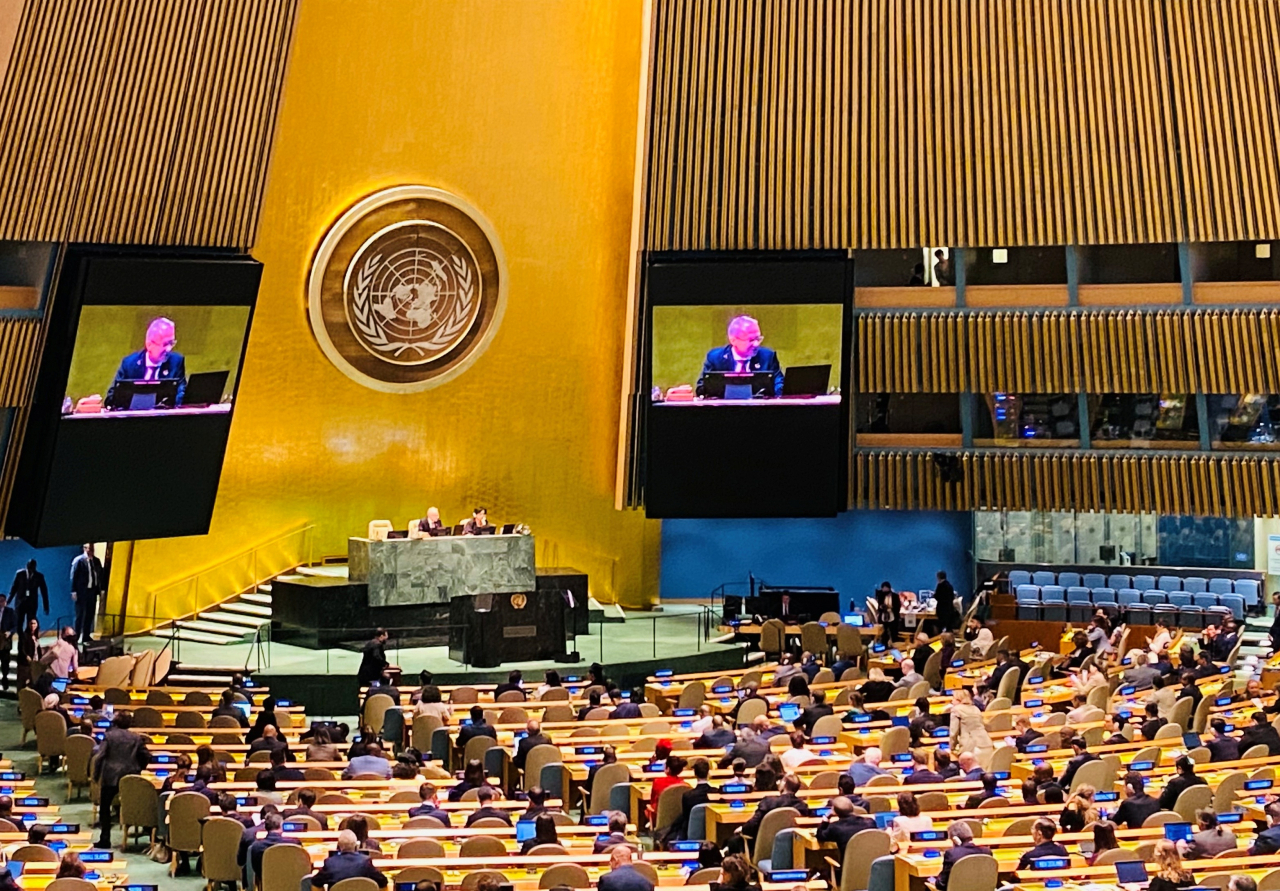 |
The United Nations General Assembly. (Yonhap) |
South Korea is stepping up efforts to lead global peace initiatives, emboldened by winning a two-year term on the United Nations Security Council at an election Tuesday, as it doubles down on fighting security challenges -- the biggest of which is North Korea.
Beginning in January next year, Seoul will serve as one of the 10 nonpermanent members of the UN’s most powerful body, which also includes five permanent members with veto power: China, France, Russia, the UK and US. The annual election selects countries to replace five nonpermanent seats each year.
President Yoon Suk Yeol described the win as “the victory of South Korea’s outreach to the world,” his spokesperson said Wednesday. Seoul, which received 180 votes out of 192 voting countries -- more than the required two-thirds of the General Assembly -- last served on the council from 2013-2014, following its first-ever term from 1996-1997.
In a statement released the same day, the Foreign Ministry in Seoul said South Korea will “proactively contribute to efforts by the council to contain North Korea’s growing nuclear threats,” referring to increasing aggression from the isolated country as it defies UN and international sanctions prompted by its nuclear buildup.
Pyongyang, which wants sanctions relief before returning to stalled nuclear talks, last week launched what it claims was a military reconnaissance satellite test amid suspicion that the launch could be a cover to test ballistic missiles. UNSC resolutions ban the country from using ballistic missile technology.
The North has hinted at a second test following last week’s failed attempt, despite protests from South Korea, the US and Japan, a three-way coalition that has been working on denuclearizing Pyongyang. In a rare intervention, the International Maritime Organization -- the UN agency responsible for ship safety -- condemned the launch in a resolution.
The US-led coalition is expected to back bigger checks on North Korea starting next year, when both Seoul and Tokyo will officially begin their council work as nonpermanent members. South Korea will be the council president in June, a monthly job for each council member. A presidential statement, though not as binding as UNSC resolutions, could pressure North Korea.
But experts see such changes to come as leading to either more of the status quo or a boost.
“China and Russia, the two members wielding veto power, wouldn’t budge; they would continue to resist whatever the US brings to the table when it comes to North Korea,” said Shin Jong-woo, a senior analyst at the Korea Defense and Security Forum. “The three-way cooperation isn’t likely to lead to a meaningful breakthrough,” he noted, referring to Washington’s tension with both Beijing and Moscow.
Park Won-gon, a professor of North Korean Studies at Ewha Womans University, said a breakthrough in dealing with North Korea’s disarmament “could be too far out there.”
But he stressed rallying international opinion against North Korea and using that to openly communicate Seoul’s concerns about Pyongyang’s aggression to China and Russia are crucial.
“I wouldn’t call that a breakthrough, but I believe doing so is just as meaningful for South Korea as it explores options on North Korea,” Park said, adding Seoul should be able to jointly handle other global issues that demand just as much attention from the 15-member body in charge of global peace and prosperity.
South Korea has pledged to promote UN peacekeeping operations, women’s rights, cybersecurity and the urgency of climate action.
“We will work more closely with those countries that are not on the UNSC but want their voices taken into account for UNSC decisions affecting them,” a senior Foreign Ministry official in Seoul said. The ministry launched a task force to prepare for the two-year role.
The other four countries elected to the UN body are Algeria, Guyana, Sierra Leone and Slovenia. Algeria, Guyana, Sierra Leone and South Korea ran unopposed for a seat, while Slovenia outpaced Belarus. The five countries, selected as per geographical representation, will replace Albania, Brazil, Gabon, Ghana and the United Arab Emirates.







